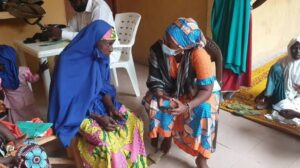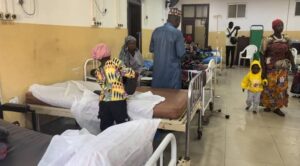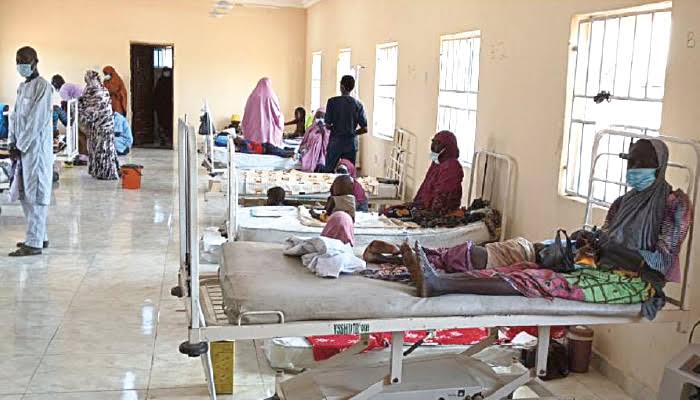Nigeria’s healthcare system is facing numerous challenges, including inadequate infrastructure, corruption, and a shortage of skilled healthcare professionals.
The News Agency of Nigeria (NAN) reports that yhese issues have resulted in a decline in the quality of care, leading to poor health outcomes and a general distrust of the system.
It is imperative that urgent action is taken to address these challenges and restore the integrity of Nigeria’s healthcare system.”
In Kaduna State, a cross section of the residnets decried that Nigeria’s healthcare system has been plagued by a myriad of challenges.
They include expired drugs, obsolete equipment, and negligence by medical personnel, leading to misdiagnosis and death.
They also listed the other challenges to include inadequate funding, poor regulation, and inefficient supply chain management are root causes of the problems.
They complained, “The healthcare sector is severely underfunded while it is lacking the direly needed human and material resources.”
A patient, David Kure, who claimed to have been wrongly diagnosed with HIV at a Kaduna hospital due to expired equipment said he underwent three consecutive tests to confirm his status.
He said, “Health workers’ poor attitude is another major issue.
“Nurses in government hospitals are often rude and unprofessional, exacerbating the problems facing the healthcare system.
“The stakeholders must work together to improve funding, strengthen regulation, and promote accountability.
” A multifaceted approach is required to address the challenges facing the healthcare system.
“Medical personnel, pharmacists, and policymakers must collaborate to ensure access to quality healthcare services.”
According to Kure, effective accountability mechanisms are needed to address negligence and misconduct.
He added, “The healthcare system’s challenges require a collective effort to resolve.
“Stakeholders must prioritize resource allocation, transparency, and accountability to improve healthcare services in Nigeria.
“Nigeria’s healthcare system is one of the weakest in Africa, with inadequate infrastructure, equipment, and personnel.
” This has led to a high mortality rate and low life expectancy.

“The country’s healthcare system is also plagued by corruption, with medical personnel and hospital administrators embezzling funds meant for healthcare services.”
According to Kure, patients often have to pay out-of-pocket for medical services, including surgeries and medications.
He said,” This has led to a high number of untreated illnesses and deaths.
“The lack of healthcare infrastructure in rural areas has also exacerbated the problems facing the healthcare system.
” Many rural communities lack access to basic healthcare services.
“Healthcare workers in Nigeria are also poorly trained and equipped to handle complex medical cases.
“This has led to a high number of medical errors and misdiagnoses.”
Most of the respondents posited that the country’s healthcare system is also plagued by a shortage of medical personnel, including doctors, Nurses, and Pharmacists.
They said that this has led to a high workload for existing healthcare workers.
“Nigeria’s healthcare system is also heavily reliant on donor funding, which is often unpredictable and unsustainable.

“This has led to a lack of continuity in healthcare services.
“The country’s healthcare system is also plagued by a lack of data and research, which has hindered efforts to improve healthcare services.
“Efforts to reform the healthcare system have been slow and ineffective, with many stakeholders resisting change.
” This has led to a lack of progress in improving healthcare services.
“The healthcare system’s challenges have also had a significant impact on the economy,”they added.
According ot them, many businesses and industries affected by the lack of access to quality healthcare services.
They added, “The country’s healthcare system is also plagued by a lack of accountability, with many healthcare workers and hospital administrators not held accountable for their actions.
“Patients and their families often have to resort to seeking medical attention abroad, which is often expensive and inaccessible to many Nigerians.
“The healthcare system’s challenges have also led to a brain drain, with many healthcare workers emigrating to other countries in search of better working conditions and opportunities.
“Efforts to address the healthcare system’s challenges must be sustained and supported by all stakeholders, including the government, healthcare workers, and patients. “
In Katsina State, some victims of wrong diagnosis, tests results interpretation and prescription of drugs by some medical personnel in health facilities, have urged the government to intensify efforts in addressing the problem.
They made the complaint in an interview with the News Agency of Nigeria (NAN) in Katsina.
The victims said that the call has become imperative in view of increasing rate at which, those problems reoccurring in health facilities in the country.
According to them, such problems sometimes lead to the death of the victims, hence the need for both the federal and state governments to hasten taking measures to address the menace.
Alhaji Haruna Umar, a victim, said that he was diagnosed as having a fluid between his stomach and chest that affects him seriously in one of the tartiary health facilities in the state.
He said that he paid for all the tests and for the theatre.
“I was operated only to discover that was not the real problem I am suffering.
“Instead, they observed another problem in my stomach, they did another operation, same time.
“Intact, I suffered a lot as a result of that, many people never believed that I will survive, because I spent about two months in the hospital recieving treatment.
“My family also spent a lot of money. It just a bad and terrible experience.
“It was after a month, when I regained my conscious that the team leader who happens to be a consultant, informed me all what happened during the period.
“He apologised to me, and I pardoned them,” he said.
He therefore urged the government hasten taking measures in checking the problem.
Umar also urged the government to force such facilities to pay some compensation to victims to serve as deterrent and reduce the financial burden on the victim’s relatives.
Another victim, Alhaji Lawal Abdullahi, said that he now he cannot walk with his two legs due to wrong operation on his knee.
He said that the theatre was performed at a private health facility by a consultant orthopedic
According to him, he spent huge amount of money, but the problem persisted.
He said that hitherto the operation, he can manage to walk with his legs, but since the operation, he can’t do anything with the leg.
Instead, he said, he was been pushed in a wheelchair.
“I was advised to travel to Egypt for another operation, which I did. They tried their best, but due to the initial problem created during the first operation, up to now things never become normal.
“As you can see me now, I can walk little, my knee still has problem. I didn’t know what to do now because I am tired of the operation,” he lamented.
Abdullahi called on the intensify efforts in equipping healthcare facilities with modern machines for effective service delivery.
In his contribution, a health expert, Mr Ibrahim Musa, advised both the federal and state governments to focus attention in the area of training and retraining of health personnel.
He said that would assist greatly in addressing some of those problems reoccurring in the health facilities in the country.
He also advised the government to put some penalties against any facility found with such wrong doings.
In Kano State, some experts in the healthcare sector have called on the government to address the growing concerns of negligence that are undermining the quality of healthcare delivery in the state.
The experts, in a separate interviews with the News Agency of Nigeria (NAN), said that various issues plaguing the system, including the widespread use of obsolete medical equipment and the improper interpretation of diagnostic data.
They also lamented that some healthcare professionals are guilty of negligence and carelessness in attending to patients further exacerbating the crisis.
These lapses, the experts argued, have resulted in a decline in patient safety and public trust in the healthcare system.
An expert in Community Health, Dr Ghali Nura, emphasized the urgent need for reform and total overhaul of the sector.
“The health sector is at a critical juncture.
“If we do not act now to update our medical equipment, address the issue of expired drugs, and ensure the competency of healthcare personnel, we risk a major public health crisis,” he said.
Dr. Bashir Shaza, a public ealth analyst, stressed the need for better oversight and stricter regulations.
“It is troubling to see that some medical institutions continue to operate outdated machines that cannot provide accurate test results.
“This not only affects diagnosis but can lead to wrong treatments, which are detrimental to patient outcomes,” he stated.
Ali Muhammad, a public affairs commentator, called on the government to allocate more resources to the healthcare sector.
He also called on the government at all levels to focus on the procurement of modern medical equipment, improved training for healthcare personnel, and stricter enforcement of regulations to prevent the circulation of expired drugs.
Muhammad also urged the government to improve transparency and accountability within healthcare institutions to restore public confidence.
A resident of Yankaba in Nasarawa Local Government Area, Musa Isa, called for a more efficient and accessible healthcare system in the state.
He cited the growing concerns over long waiting times, limited medical facilities, and a lack of essential services particularly in rural areas.
Another resident of Zoo Road in Tarauni Local Government Area, Malama Aisha Inuwa, said that the state need better healthcare facilities, more doctors, and more affordable services for everyone.
“We need healthcare that is affordable and that will work for us, not just in theory, but in reality,” she said.
The News Agency of Nigeria (NAN) reports that Kano State Government had allocated N90.6billion for the health sector in 2025 budget. NAN


